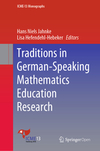- About MAA
- Membership
- MAA Publications
- Periodicals
- Blogs
- MAA Book Series
- MAA Press (an imprint of the AMS)
- MAA Notes
- MAA Reviews
- Mathematical Communication
- Information for Libraries
- Author Resources
- Advertise with MAA
- Meetings
- Competitions
- Programs
- Communities
- MAA Sections
- SIGMAA
- MAA Connect
- Students
- MAA Awards
- Awards Booklets
- Writing Awards
- Teaching Awards
- Service Awards
- Research Awards
- Lecture Awards
- Putnam Competition Individual and Team Winners
- D. E. Shaw Group AMC 8 Awards & Certificates
- Maryam Mirzakhani AMC 10 A Awards & Certificates
- Two Sigma AMC 10 B Awards & Certificates
- Jane Street AMC 12 A Awards & Certificates
- Akamai AMC 12 B Awards & Certificates
- High School Teachers
- News
You are here
Traditions in German-Speaking Mathematics Education

Publisher:
Springer
Publication Date:
2019
Number of Pages:
278
Format:
Hardcover
Series:
ICME-13 Monographs
Price:
59.99
ISBN:
978-3-030-11068-0
Category:
Collection
[Reviewed by , on ]
Wes Maciejewski
07/8/2019
There can be little dispute about the claim that mathematicians from German-speaking regions largely created contemporary mathematics: Leibniz, Gauss, Riemann, Minkowski, Euler, Weierstraß, Cantor, Hilbert, Gödel, Einstein, Noether, and so many others. It should not come as a surprise then to an outsider to mathematics education that German-speakers had equally profound contributions to mathematics education: Humboldt, Klein, Freudenthal (education as a field has comparatively less heroes and heroines). This edited volume presents this proud and profound tradition as it continues today.
The true strength of this work is that it brings together some of the top and most recognized mathematics education researchers from German-speaking countries to display German mathematics education research to an international audience. There’s much to be experienced here and that it is written in English is truly valuable: many of the authors tend to produce works primarily in German, and their ideas are not readily accessible to an auslander.
My primary interest in reading this collection was to gain a better understanding of constructs in German mathematics education that are not quite comparable to those in English traditions. In particular, Grundvorstellungen (elementary notions) and Allgemeinbildung (general education for all) are vital constructs in German mathematics education without exact analogues in English education traditions. The collection does not disappoint with its presentation of these and other foundations: many of the papers emphasize the historical and continuing traditions of these foundations, clearly demonstrating the uniqueness of German-speaking mathematics education research and practice.
Some of the chapters focus on topics that experience more international attention (i.e. design science, mathematical modeling, classroom studies, and large-scale studies). But even in these, the authors relate the unique German perspectives and contributions. A reader working in these areas will find these chapters stimulating, offering a broadening of perspective.
Equally as important as what is included in the book is what is not present. Some of the most visible contemporary research topics in, for example, the United States and Canada–equity and social justice, for example–are entirely absent from this book. That’s not because these are not researched in Germany, they are, but certainly to a lesser extent than elsewhere. This is revealing and indicative of the German educational context: Germany is, especially relative to many parts of North America, a fairly homogeneous society. This is changing rapidly, however, and issues of equity and social justice will increase in prominence. This presents bountiful opportunities for cross-border collaborations.
In sum, this book ought to appeal to mathematics education researchers within German-speaking countries, to get in touch with their proud and long history of mathematics education, and to those outside, to gain new perspectives on vital topics.
Wes Maciejewski is an assistant professor at San Jose State University. His research interests are primarily in mathematics education at the post-secondary level.
Wes Maciejewski is an assistant professor at San Jose State University. His research interests are primarily in mathematics education at the post-secondary level.
See the publisher's web page.
- Log in to post comments




